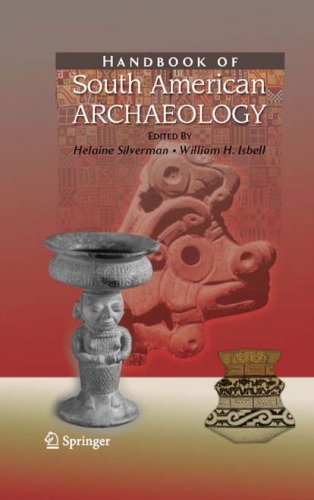

Most ebook files are in PDF format, so you can easily read them using various software such as Foxit Reader or directly on the Google Chrome browser.
Some ebook files are released by publishers in other formats such as .awz, .mobi, .epub, .fb2, etc. You may need to install specific software to read these formats on mobile/PC, such as Calibre.
Please read the tutorial at this link: https://ebookbell.com/faq
We offer FREE conversion to the popular formats you request; however, this may take some time. Therefore, right after payment, please email us, and we will try to provide the service as quickly as possible.
For some exceptional file formats or broken links (if any), please refrain from opening any disputes. Instead, email us first, and we will try to assist within a maximum of 6 hours.
EbookBell Team

4.8
94 reviewsThe Handbook of South American Archaeology has been created as a major reference work for archaeologists working in South America, professors and their upper-division undergraduate and graduate students in South American archaeology courses including areal courses (Central Andes, North Andes, tropical lowlands), archaeologists working elsewhere in the world who want to learn about South American prehistory in a single volume.
The contributions of this seminal handbook have been commissioned from leading local and global authorities on South America. Authors present the dynamic evolutionary processes of the ancient societies and principal geographical regions of the continent and consider issues such as environmental setting and ecological adaptations, social equality/inequality, identity formation, long-distance/intercultural interaction, religious systems and their material manifestations, ideological orientations, and political and economic organization as these developed over time.
The volume is organized thematically to promote and facilitate geographical comparisons, notably between the Andes and greater Amazonia. The bibliography section of each chapter is a valuable research tool in itself for readers wishing to delve deeper into the particular topics under consideration. Of particular merit and originality is the final section dealing with the ethics and practice of archaeology in South America today with each contribution written by a local scholar.
This edited work presents long-term research results while simultaneously highlighting the most exciting new research and greatest archaeological problems recently resolved or still awaiting solution. Chapters are written in accessible language and each contribution includes maps and many other figures and photographs to illustrate the text.
Handbook of South American Archaeology belongs on the bookshelf of every archaeologist working or living in South American but also will be of interest to those who study larger anthropological issues - such as cultural adaptation and state formation - in the prehistoric and historic periods.